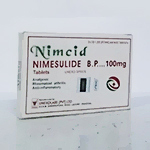Overview
Fenicol contains Chloramphenicol, a broad-spectrum antibiotic used to treat serious bacterial infections when other antibiotics are unsuitable or ineffective. It works by inhibiting protein synthesis in bacteria, preventing their growth and spread. Due to its potency and potential side effects, Fenicol is usually reserved for specific infections under close medical supervision.
Uses
Fenicol may be prescribed for:
-
Typhoid fever and other severe Salmonella infections
-
Meningitis caused by susceptible bacteria
-
Respiratory tract infections (when resistant to first-line treatments)
-
Serious eye infections (in ophthalmic preparations)
-
Brain abscesses and rickettsial infections in special cases
Dosage & Administration
-
Available in tablet, capsule, suspension, and injection forms.
-
Dose is based on age, weight, and severity of infection.
-
Must be taken exactly as prescribed.
-
Complete the full course even if symptoms improve early to avoid bacterial resistance.
Side Effects
Possible side effects include:
-
Nausea, vomiting, or diarrhea
-
Mouth ulcers or sore throat
-
Headache or dizziness
-
Skin rash or itching
-
Rare but serious: bone marrow suppression, aplastic anemia, or low blood cell counts
Warnings & Precautions
-
Reserved for serious infections where safer antibiotics cannot be used.
-
Not recommended in pregnancy or lactation unless clearly necessary.
-
Patients with liver or kidney disease should use with caution.
-
Regular blood counts may be required during therapy to monitor bone marrow function.
-
Avoid self-medication; must be used under strict medical supervision.
Contraindications
Do not use Fenicol if you:
-
Are allergic to Chloramphenicol
-
Have a history of blood disorders (aplastic anemia, bone marrow suppression)
-
Are taking other medicines known to affect bone marrow unless prescribed by a specialist
Storage
-
Store at room temperature, away from direct light and moisture.
-
Keep tightly closed and out of reach of children.
Doctor’s Review
“Chloramphenicol (Fenicol) is a powerful antibiotic with an important role in treating life-threatening infections such as typhoid and bacterial meningitis, especially in areas where resistance to other antibiotics is common. However, it carries significant risks, including rare but severe effects on the bone marrow. Because of this, its use must be carefully monitored by a physician, and it is not suitable for routine infections.”
— Dr. Fahad Ahmed, Consultant Infectious Disease Specialist
Disclaimer
This description provides product information only. It is not a prescription or substitute for professional medical advice. Always consult a qualified doctor before starting, changing, or discontinuing this medication.








Reviews
There are no reviews yet.